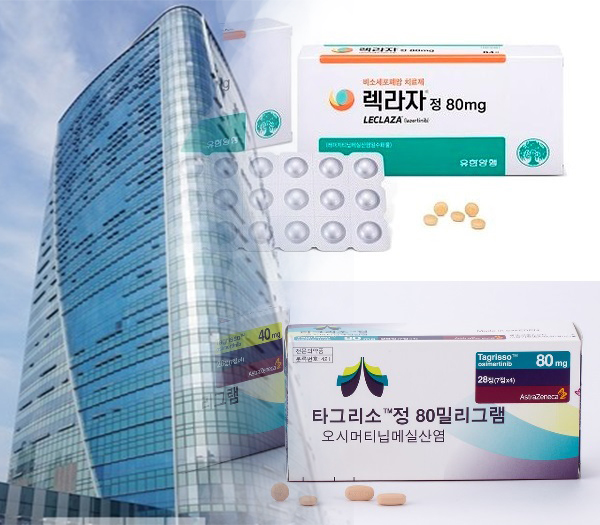Yuhan Corp.’s Leclaza (ingredient: lazertinib), a third-generation treatment for EGFR-mutated non-small cell lung cancer (NSCLC), has won the health insurance benefits in just six months of obtaining the marketing license.
However, AstraZeneca’s Tagrisso (osimertinib), which was developed before Leclaza, has repeatedly failed to get the benefits in the first-line NSCLC treatment market.
The delayed reimbursement prompted lung cancer patients to urge the Health Insurance Review and Assessment Service (HIRA), a lung cancer society, and the drugmaker to make a swift decision.
HIRA announced on Monday that it would grant reimbursement for Leclaza as the monotherapy treatment of T790M mutation-positive locally advanced or metastatic NSCLC following EGFR-TKI administration. The reimbursement takes effect on July 1.

Yuhan received the permit for Leclaza as the nation’s 31st novel drug. It is a targeted therapy inhibiting the proliferation and growth of lung cancer cells by interfering with the signal transduction involved in lung cancer cell growth. Leclaza obtained the license on Jan. 18 and got insurance benefits in six months.
EGFR-TKI as the first-line treatment of advanced EGFR mutation-positive NSCLC causes T790M mutation, an acquired resistance mutation, in half of the patients.
Before Leclaza came, Tagrisso was the only treatment for this indication.
However, with the arrival of Leclaza, Yuhan and AstraZeneca will directly compete in the second-line treatment of EGFR mutation NSCLC.
Tagrisso, which expanded the indication for EGFR-mutated NSCLC in 2018, has failed to get reimbursement for two and a half years.
AstraZeneca tried to get reimbursement for Tagrisso immediately after getting expanded indication for the first-line treatment.
However, HIRA’s cancer drug review committee kept rejecting the company’s application.
After the review committee disapproved of Tagrisso’s reimbursement expansion for the first-line therapy in a meeting in April, lung cancer patients filed a complaint with HIRA and called on the related society and the drugmaker to push HIRA to speed up reimbursement.
With the help of the Korea Blood Disease & Cancer Association, Lung cancer patients and their families had a signing campaign for the reimbursement for Tagrisso as the first-line treatment.
The patients and their families gathered 1,713 signatures within a week and filed a complaint with HIRA.
The lung cancer patients and their families said they could not afford Tagrisso, which costs over 6 million won monthly.
Whenever they heard that the HIRA would discuss the reimbursement for Tagrisso as the first-line treatment, they were desperate to hear that the drug won the benefits, they said.
However, when they heard the HIRA rejected the reimbursement, they felt like the world was falling apart, they added.
“Despite Tagrisso’s high price, patients have to choose it inevitably to get treatment,” a patient said. “I wish the HIRA’s cancer drug review committee could grant reimbursement for Tagrisso as the first-line therapy.”

